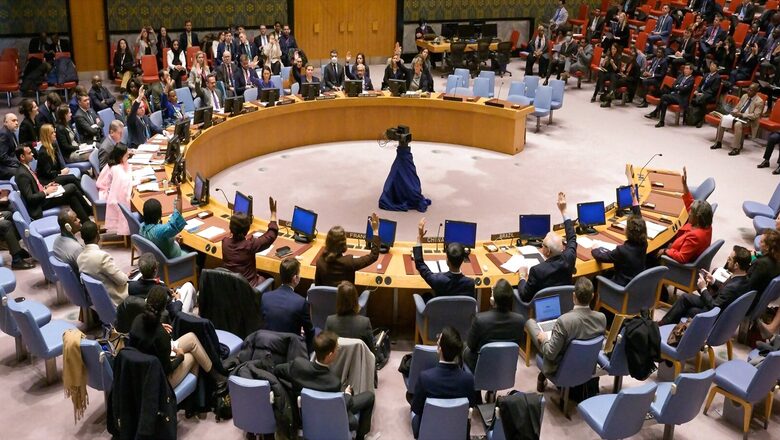
views
The recent Resolution 2664 adopted by the United Nations Security Council (UNSC) on 9 December 2022, under chapter VII of the United Nations Charter that creates mandatory obligations upon the states to abide by the resolutions — unlike any other general resolutions — seeking to minimise and mitigate the problems of humanitarian actors and donors to respond more quickly and effectively, marks an important development. This resolution has been drafted by the US along with Ireland to safeguard humanitarian activities, especially the abuse and diversion of humanitarian aid for promoting conflict. It aims to bring relief and clarity to the international community, humanitarian assistance providers and critical commercial service providers who are primarily involved in supplying goods and other related services.
Such a resolution holds greater significance as around 50 million people across the world need humanitarian aid and this unprecedented situation takes them on the verge of famine. What needs to be understood is that through this resolution, the sanctions imposed by the UNSC in future would be mandatorily required to comply with key obligations, under International Humanitarian Law (IHL) — especially considering the changing geopolitical dynamics around the world, including the ongoing Russia-Ukraine War and the human rights violations being committed by the Taliban in Afghanistan. The resolution commits to implement such directions in the domestic matters of the state without interfering with Article 2(7) of the UN Charter to strengthen the objective of the UN to maintain international peace and security.
For several years, different international organisations such as the International Committee of the Red Cross (ICRC) whose functions hold considerable importance, have been facing increasing difficulties in carrying out humanitarian actions due to the UNSC sanctions. Given the significance of this resolution, it has been backed by 50 countries that continue to engage with international organisations like the ICRC.
In this light, there is a need to understand what exactly the goals of the ICRC, from a humanitarian perspective, are i.e. the link between humanitarian action, development and peace efforts focussing on protracted conflicts and fragile settings, where the co-existence of development and peace struggle to take place simultaneously.
The point to focus on here is that it’s the relevant actors within the peace and development sectors that assist the ICRC in carrying out its functions. To illustrate, behind ‘development’, it is primarily the state authorities at the central and sub-national levels and the donors and investors working with them, whereas behind ‘peace’ are the actors involved in war such as political decision-makers, state and non-state armed actors and those who support them. One example of such an effort taken up by the ICRC includes the National Society Investment Alliance, a pooled fund managed jointly by the ICRC and the International Federation of Red Cross and Red Crescent Societies (IFRC), which supports National Societies’ capacity to deliver on their mission in a sustainable manner.
Overall, the aim of the ICRC is to have a sustainable humanitarian impact by maintaining the relevance and effectiveness of the ICRC’s action in relation to people’s needs as they evolve over time, particularly in protracted conflicts and chronic situations of violence. It also aims to provide not only life-saving but also life-sustaining action that supports people’s ability to live and rebuild their lives with autonomy, agency and dignity where no one is ignored or excluded.
Lastly comes the issue of implementation, which is a major challenge facing IHL generally. The issue is putting into action the states’ legal obligations for which they themselves have the primary responsibility of implementation. Under the 1949 Geneva Conventions and their 1977 Additional Protocols, states have the duty to ensure that humanitarian law is implemented and respected, and for which it must adopt a range of national legislative and administrative measures. In this regard, the ICRC has put in place measures for the states to discharge their international obligations, and to promote national implementation by establishing an Advisory Service on International Humanitarian Law.
Going forward, the onus remains on the states to establish such national committees that facilitate the process of humanitarian work. Such an approach has also been supported by the Intergovernmental Group of Experts for the Protection of War Victims who recommend that states “be encouraged to create national committees, with the possible support of National Societies, to advise and assist governments in implementing and disseminating IHL” and “to facilitate cooperation between national committees and the ICRC.”
Abhinav Mehrotra is Assistant Professor, OP Jindal Global University; Biswanath Gupta is Associate Professor, OP Jindal Global University. Views expressed are personal.
Read all the Latest Opinions here




















Comments
0 comment